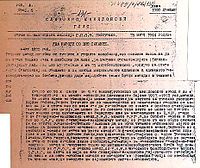| South Slavic languages and dialects |
|---|



The Slavic dialects of Greece are the Eastern South Slavic dialects of Macedonian and Bulgarian spoken by minority groups in the regions of Macedonia and Thrace in northern Greece. Usually, dialects in Thrace are classified as Bulgarian, while the dialects in Macedonia are classified as Macedonian, with the exception of some eastern dialects which can also be classified as Bulgarian. Before World War II, most linguists[2] considered all of these dialects to be Bulgarian dialects.[3][4][5][6] However, other linguists opposed this view and considered Macedonian dialects as comprising an independent language distinct from both Bulgarian and Serbo-Croatian.[7][8][9][10][11]
- ^ See Ethnologue ([1] Archived 2008-05-05 at the Wayback Machine); Euromosaic, Le (slavo)macédonien / bulgare en Grèce, L'arvanite / albanais en Grèce, Le valaque/aromoune-aroumane en Grèce, and Mercator-Education: European Network for Regional or Minority Languages and Education, The Turkish language in education in Greece. cf. also P. Trudgill, "Greece and European Turkey: From Religious to Linguistic Identity", in S Barbour, C Carmichael (eds.), Language and nationalism in Europe, Oxford University Press 2000.
- ^ Hupchick, Dennis P. (1995). Conflict and Chaos in Eastern Europe. Palgrave Macmillan. p. 143. ISBN 0312121164.
The obviously plagiarized historical argument of the Macedonian nationalists for a separate Macedonian ethnicity could be supported only by linguistic reality, and that worked against them until the 1940s. Until a modern Macedonian literary language was mandated by the communist-led partisan movement from Macedonia in 1944, most outside observers and linguists agreed with the Bulgarians in considering the vernacular spoken by the Macedonian Slavs as a western dialect of Bulgarian
- ^ Mladenov, Stefan. Geschichte der bulgarischen Sprache, Berlin, Leipzig, 1929, § 207-209.
- ^ Mazon, Andre. Contes Slaves de la Macédoine Sud-Occidentale: Etude linguistique; textes et traduction; Notes de Folklore, Paris 1923, p. 4.
- ^ Селищев, Афанасий. Избранные труды, Москва 1968, с. 580-582.
- ^ Die Slaven in Griechenland von Max Vasmer. Verlag der Akademie der Wissenschaften, Berlin 1941. Kap. VI: Allgemeines und sprachliche Stellung der Slaven Griechenlands, p.324.
- ^ Antoine Meillet (French, linguist, 1928): Their dialects, differing among themselves, are not truly Serbian nor truly Bulgarian, especially if one is thinking of written Bulgarian, which is based on dialects quite far removed from the Macedonian dialects. In reality these dialects do not properly belong to either the one or the other of the two groups under dispute.
1. Todor Dimitrovski, Blaže Koneski, Trajko Stamatoski. About the Macedonian language; "Krste Misirkov" Institute of the Macedonian Language, 1978; p.31.
2. Kulturen Život. Macedonian Review, Volume 10; Kulturen Zhivot., 1980; p.105 - ^ Vaillant, André (1938), "Le Problème du slave macédonien, Bulletin de la Société linguistique, 39, 2(# 116): 194–210, cited in Fishman, J. A. (ed) (1993), The Earliest Stage of Language Planning, New York, p. 164.
- ^ Małecki, M. (1938), Z zagadnień dialektologii macedońskiej, Rocznik slawistyczny, 14: 119–144, cited in Fishman, J. A. (ed) (1993), The Earliest Stage of Language Planning, New York, p. 164.
- ^ "Несмотря на значительное диаметральное разнообразие, македонские говоры представляют собою единство и заметно отличаются от народных говоров Фракии, Родоп, Мизии и Балкан" [Despite their considerable diametrical diversity, Macedonian dialects represent a [linguistic] whole and differ markedly from the folk dialects of Thrace, the Rhodopes, Moesia and the Balkans]. Berstein, S. (1938), Great Soviet Encyclopedia, no. 36, p. 743, cited in Bernstein (1944), Несколько замечаний о македонском литературном языке [Some remarks on the Macedonian literary language].
- ^ Alexis Heraclides, The Macedonian Question and the Macedonians: A History, Taylor & Francis, 2021, ISBN 9780429266362, pp. 152–153.
© MMXXIII Rich X Search. We shall prevail. All rights reserved. Rich X Search
